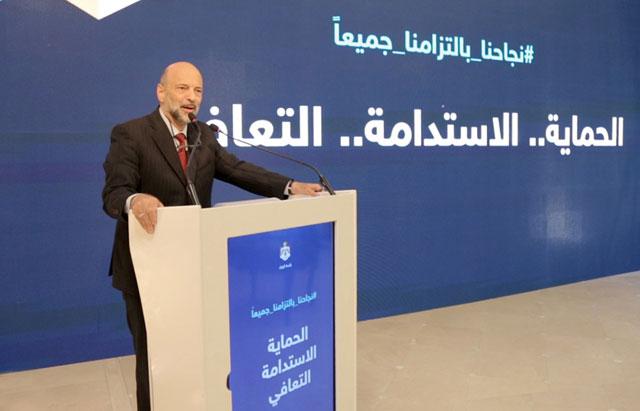- Local News
- Tue-2020-06-16 | 03:16 pm

During a media event held at the Prime Ministry to announce the measures taken to support the tourism sector, Razzaz said that these new moves aim to complement previous measures to reduce current costs and provide the necessary liquidity.
Stressing that challenges facing the tourism sector are "not due to internal measures”, Razzaz highlighted the global decline in this field and its role in the Kingdom's economy.
Responding to a question on reopening the airports and border crossings, Razzaz said that the caution observed in this arena is linked to maintaining the Kingdom's "reassuring” epidemiological condition.
The tourism sector, among others, "will not see a quick recovery”, he added, pointing out that Defence Orders No. 13 and No. 14 aim to protect the sector.
Defence Order No. 13 concerns bank guarantees submitted by tourism offices and umrah and Hajj agencies and the possibility of refunding them during the current stage, which is witnessing financial liquidity problems, he said, noting that the amount of these guarantees exceeds JD30 million.
Defence Order No. 14 includes a social security programme to protect the workers in the tourism sector.
Credit facilities worth JD150 million will be offered to the Kingdom’s hotels and tourism institutions, Tourism Minister Majd Shweikeh announced during the press conference.
The credit facilities, part of the Central Bank of Jordan’s programme allocated towards COVID-19-affected economic sectors and the national programme for finance and loan guarantees to confront the crisis, will be granted in the form of soft loans to finance the salaries and operating expenses of the Kingdom’s hotels and tourism facilities, Shweikeh said.
The soft loans, 85 per cent guaranteed by the Jordan Loan Guarantee corporation for 42 months, will include a 12-month grace period, while the government will pay 2 per cent of the interests throughout the loan period, she added.
She also stressed that, to benefit from this financing, tourism institutions are required to retain their Jordanian workers.
Shweikeh also announced that the tourism sector’s 2019 due taxes will be divided into installations without fines or interest according to a time table that extends from July to December 2020.
Tourism support measures also include cutting sales tax for hotels and restaurants to 8 per cent instead of 16 per cent, excluding the Aqaba Special Economic Zone Authority, where taxes will remain at 7 per cent.
The decisions also included reducing the service tax imposed on restaurants and hotels to 5 per cent instead of 10 per cent as of July 1, according to Shweikeh.
Licensed Oriental antiques shops can benefit from the JD3 million soft loans programmes available for tour guides, to be guaranteed by the Jordan Tourism Board, she added, pointing out that the programme will be implemented through a local bank to be announced later.









